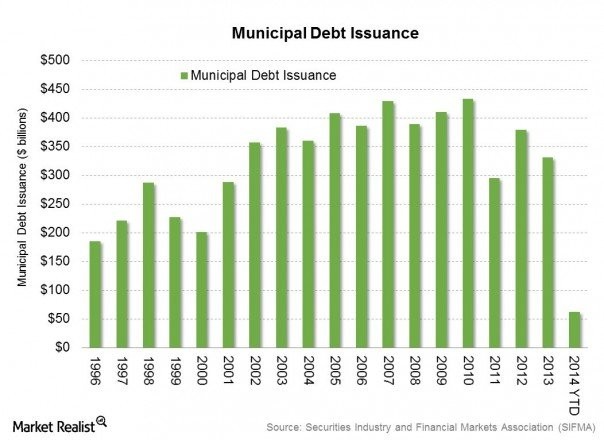Municipal bonds Income Investing
Post on: 14 Октябрь, 2015 No Comment

Diverse Economy Will Help Texas Weather Oil Downturn Fitch
By Michael Aneiro
Associated Press A well pump near Sweetwater, Texas.
Fitch Ratings today explores how local Texas economies will be able to hold up given the enormous drop in oil prices. Fitch said the decline will have a targeted effect and may have implications for economic and revenue trends for certain Texas cities, counties and school districts. From Fitch:
The state overall and many of the larger municipalities have well-diversified economies, and Fitch expects any losses in oil revenue to be limited and offset to some degree by increased consumer spending. However, a number of local governments in the three major production areas of the state will likely see declines in taxable values and weaker economic activity if oil prices do not recover and exploration slows, leading to declines in property tax and economically sensitive revenues and possible budgetary pressures.
In particular, Fitch cites explosive growth in oil and gas drilling in the Eagle Ford Shale and Permian Basin regions, and to a lesser extent the Barnett Shale region in north Texas, over the past several years, resulting in an economic and financial boon for these areas through increased sales tax revenues, increased tax base valuations, construction and permit revenues, and other sector-related business activity. While extraction activity for wells that are in place is expected to continue, Fitch says new drilling is expected to slow in 2015. More from Fitch:
This slowdown will affect employment, hotels and restaurants, retail, and construction and other related businesses. Cities will feel the impact in reduced sales tax receipts, building permits and other economically sensitive revenues. The impact on taxable values also will present challenges: persistently lower mineral values likely will require tax rate increases by some cities and counties to maintain steady property tax revenue streams. Texas cities and counties typically maintain tax rates well below statutory and constitutional limits, providing the legal ability to increase rates (although not necessarily the political ability given the consequent shift of tax burden to residential taxpayers).
Looking at Texas as a whole, Fitch says the states economic base is vastly larger and more diverse than during the 1980s, when another plunge in energy prices precipitated a severe regional recession. Fitch also says the oil and gas sector plays a notably smaller role in the Texas economy than in the past. More from Fitch:
Likewise, Houstons economy has diversified over the past several decades to such a degree that the impact from an oil and gas contraction while not immaterial should be manageable. Houstons expansive petrochemical sector should benefit from lower energy prices, providing an additional economic buffer. Other petrochemical centers in the state (Beaumont/Port Arthur and Corpus Christi) also should benefit. Fitch will closely monitor budget performance and economic and tax base data in affected Texas communities over the coming months to determine if revenue pressures are sufficient to warrant rating action.
Jan 12, 2015
3:23 PM ET
BlackRock Likes Barbell Approach For Munis
By Michael Aneiro
BlackRock s municipal-bond team of Peter Hayes, James Schwartz, and Sean Carney today points out that the muni market had a perfectly positive year in 2014, posting a net gain in each of the years 12 calendar months, while muni mutual funds were nearly perfect on a weekly basis, posting net inflows in 50 out of 52 weeks. For 2015, BlackRock says investors should adopt a barbell strategy focusing on short-dated bonds maturing in two years or less and long-dated bonds maturing in 15 to 20 years. From BlackRock:
Sector-wise, BlackRock likes state tax-backed and essential-service bonds, particularly in Texas, Virginia and the Plains States, as well as school-district bonds and dedicated-tax bonds. BlackRock is underweight land-secured bonds, senior-living bonds and pre-refunded bonds, as well as Puerto Rico bonds.














